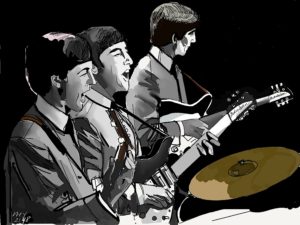Podcast: Play in new window | Download

In this discussion, Dr. Duncan Driver (SATB 205, Fab4ConJam, One Sweet Dream podcast) springboard off of the title Paul McCartney quote, in which he asserted that each Beatle was as important as another to the group’s success. We explore the shifting power dynamics within the group and the question of leadership; we also discuss Duncan’s thesis of the four distinctive elements of the Beatles collective identity: live performers – singles makers – album makers – songwriters.


Hello. I am just mid-way through listening to Four Sides of a Square, and Mr Duncan says he can’t think of another song that fits the original concept of the early concept for the Pepper album, of their childhood.
Well, Harrison’s Only a Northern Song, although tentatively about childhood, has the term “North” in it. A stronger contender in my mind, is When I’m Sixty Four, since it was an older song McCartney had written but lacked lyrics for. It was alos recorded after Strawberry Fields Forever, pre-Xmas 66.
The brass band concept of Sgt Pepper’s band is also connected to Northern English culture.
Maybe this is pushibg it a bit, but the double decker bus and the smoke on the upper deck is kinda childhood reminiscing, ain’t it? (The song also mentions Blackburn Lancashire.)
Just to mention it.
Yours
Reidar S
Good episode. I hope you never run out of material for new ones. I only began listening in late 2019, so I’m still catching up on the older episodes.
Great episode! I sure do agree with Mr.Driver when he talks about Lennon losing a lot songwriting wise lyrically when he tamps down on the imagery , allegory and imagination and starts being obsessed with himself and YOKO EXCLUSIVELY ! You are right Robert , he was merging the imagery and allegory in his books with his lyrics starting in 1965 this went till the end of the Beatles. Then it was JOHNYOKO JOHNYOKO JOHNYOKO right through Double Fantasy!
Man I love that RED HOT recording from Hamburg! George was cutting lose on that in that last solo!
Maybe The Beatles were more like an equilateral triangle, with one of them at the exact centre as a pivot around which the band revolved? The pivot position was shared (and changed from day to day, session to session, year to year). John held the position until ’65, then Paul took it over after the triumph of writing “Yesterday”. George looked like he was about to take the position in ’69 after his triumphs with “Something” and “Here Comes The Sun”, (but ultimately Ringo (as peacemaker) took the role after the breaking up of the band).
I thought the program was great till both hosts started to bash on Yoko Ono. John Lennon himself stated in 1980 that he used Ono’s Grapefruit poem to write the song, Imagine and was ashamed for not giving her credit. Lennon also used Chuck Berry’s You Can’t Catch Me. But then Lennon was sued for plagiarism. Ono was also an artist that is the difference between inspiration and collaboration. The intention and agreement artists have. It is a fine line but it’s still there. The hosts mock and contradict Lennon admitting to not giving Ono credit for her poem.
I don’t find the suggestion that a poem of Yoko’s was the inspiration behind “Imagine” entirely credible, though her poem (Grapefruit”) might well serve as evidence of a profound affinity between the two individuals. One can think of songs by Lennon that predate John’s relationship with Yoko that begin with a similar gesture (“Imagine I’m in love with you”; “Picture yourself in a boat on a river”). Also, though this is not to the same point, there is a vocal “turnaround” in John’s home (heartbreaking) demo of “If I Fell” that re-surfaces in “Imagine.”
Here’s my two cents.
Ringo has said in one or two interviews that if any one person in the group became too big-headed, the other three would bring him back to reality (and it could have been anyone, from John, down to Ringo himself).
Something that has never been addressed was the fact that had George Martin completely had his way, it would have been Paul McCartney and backing group (like what David Foster had succeeded in doing with Chicago). In the Beatles’ case, that would have never been allowed to happen, whether a Brian Epstein or a George Martin or an Allen Klein would have tried to force it on the group.
The song “Good morning, good morning” is more profound than you give it credit for. If you listen to the lyrics it’s about someone dealing with boredom in their life and their surroundings and that is John writing about his own life in a way because he’s expressing his boredom
Great show as usual , I listen to each episode at least 6-7 times . Love it